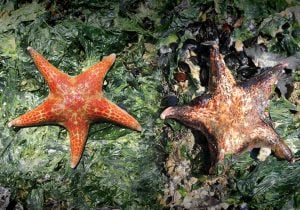The Lai family
Heading into Thanksgiving weekend, the Lais wanted to avoid buying beef, as they learned it is the protein that produces the most greenhouse gasses. As the carbon footprint of chicken is much lower, they decided to switch up their holiday tradition this year.
Calvin told Canadian Geographic the family of three gathered with their in-laws and enjoyed hanging out in their backyard garden. Calvin and Janet’s baby, Nathan, loves playing with the leaves and picking fruit off the plants, so even the youngest member of the family opted to eat local over Thanksgiving.
The Lais also used the weekend to educate themselves and their loved ones. When the family decided to cook a chicken instead of a turkey, Calvin said there were questions about why. “So it was good to explain to them the research behind it, and the reasons why we were doing it and how making small changes is doable for everybody.”











